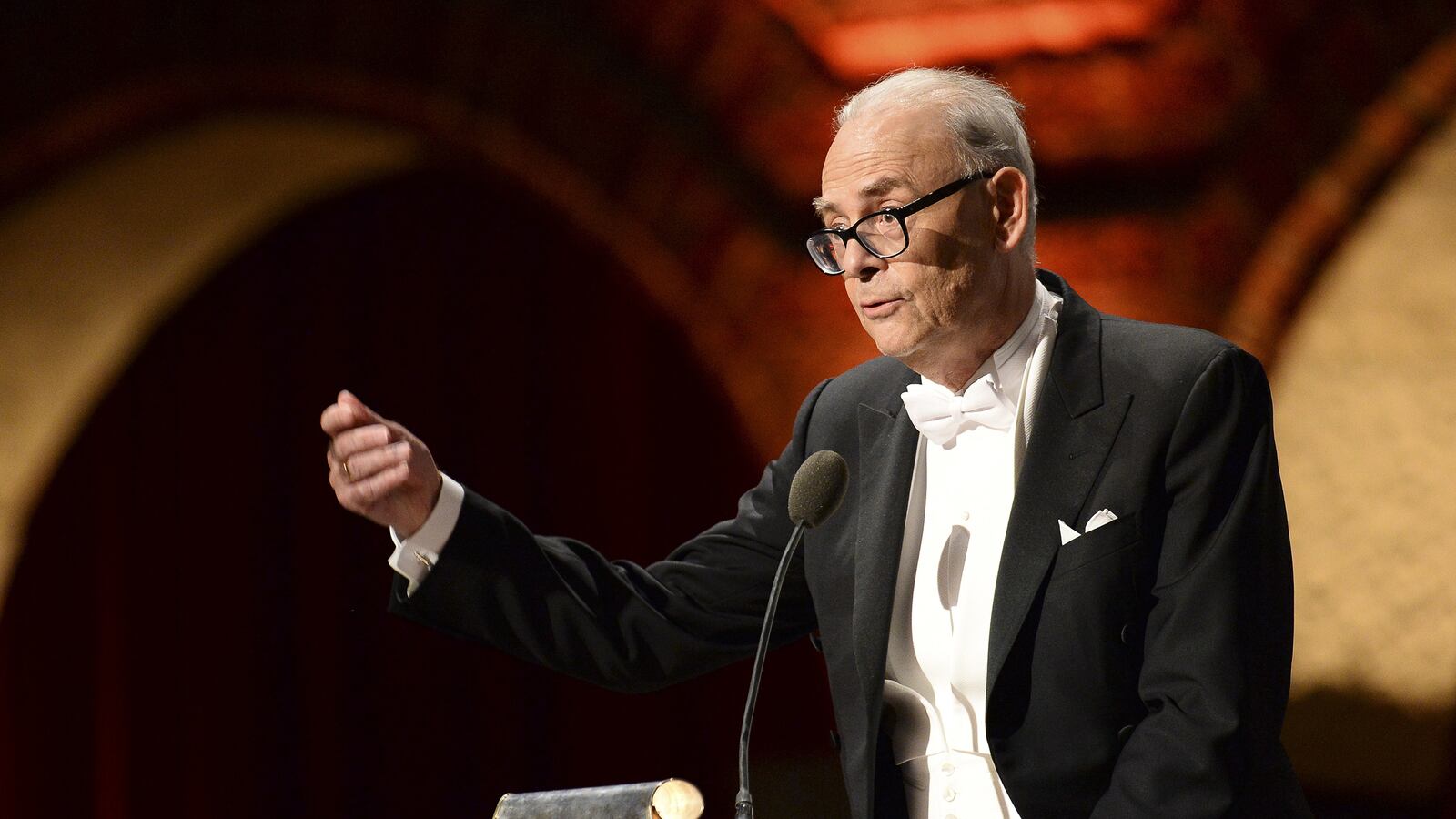On a crisp morning last October, I paused in front of one of the many magnificent bookshops that dot the city of Cologne. In the display window was a large, hand-lettered sign: NOBELPREIS FÜR LITERATUR, PATRICK MODIANO. Arrayed around the sign were a dozen works of fiction by Patrick Modiano—most in German, a few in French, none in English.
I walked into the shop and introduced myself as an American writer visiting from New York. Then I came clean: “I’m ashamed to admit it, but I’ve never even heard of Patrick Modiano. Is he any good?”
“Oh yes,” said the woman behind the cash register. Like most bookshop workers in Europe, she was young and bright, fluent in English, and criminally well read. “He’s French and he’s quite good. You should definitely read him. Start with his first novel, La Place de l’Étoile, or Dora Bruder.”
When I got back home, the sting of my ignorance was softened by reports that I am not alone. Modiano, it turns out, is virtually unknown to even the most voracious American readers. The New Yorker offered a big part of the reason why: “The vast bulk of (Modiano’s) work remains unavailable in English.”
Before trying to find out why this is so, I decided to ignore that Cologne clerk’s advice and read the newest Modiano title available in English, Suspended Sentences, a collection of three novellas from the 1980s and ’90s that was originally scheduled for publication in the U.S. in February but was rushed to market by Yale University Press to capitalize on the Nobel announcement.
That German bookshop clerk was right. Modiano is quite good though I don’t want to get into the tired argument about whether or not he is deserving of the Nobel. That horse gets a thorough beating every time Philip Roth gets passed up for the prize and it goes instead to an obscure writer only a member of the Swedish Academy could love—Elfriede Jelinek, anyone? Besides, no one with any sense automatically equates literary prizes with literary merit.
Modiano, now 69, has spent his long career working and reworking a small patch of the literary landscape. Suspended Sentences, like much of his work, is a series of meditations on the mutability of memory, essentially part of a single extended autobiographical novel he has been writing for nearly half a century, à la Proust, Henry Miller, or the current sensation from Norway, Karl Ove Knausgaard. Modiano was born in Paris in 1945, and many of his memories and imaginings are colored by the Nazi Occupation of Paris and its aftermath.
“Suspended Sentences,” originally published in 1988, is the strongest of this collection’s three novellas. It tells the story of a young boy and his brother growing up in a small town outside Paris, raised by a troupe of former circus performers who have a mysterious, possibly criminal past. The boys’ parents are largely absent—their mother is off touring with a theater company; their father works business deals in Africa and visits his sons infrequently.
The story is narrated by the elder brother—alternately called “Blissful Idiot” and “Patoche” by his warders. The prose is flat, nearly affectless, but it accumulates force quietly and veers without warning into the dark precincts of Modiano’s life. The boys’ father, like Modiano’s Jewish-Italian father, was arrested by the Germans occupying Paris during the war, then readied for deportation to a concentration camp. He was sprung by a shady acquaintance—called Louis Pagnon in two of these three novellas—and together they worked the wartime black markets in Paris as members of the notorious Rue Lauriston gang, known as the French Gestapo. The writing jumps forward and backward in time. The streets of Paris are milky and murky. One character dissolves in the rain. The writing, translated crisply by Mark Polizzotti, is laced with investigations and speculations, false leads and dead ends, with expressions such as It seems more likely…as luck would have it…unless…perhaps…he had vanished in that sudden way… The narrator of “Flowers of Ruin” becomes a writer not because of a gift or a sense of vocation, but because he can’t resist “questions that would never have an answer.”
Patrick Modiano refuses to supply tidy answers. Which may help explain why he has failed to catch on with American readers. But it’s more complicated than that.
***
Now we enter chicken-or-egg territory. Before Suspended Sentences was hurried to publication, only a few of Modiano’s 30-plus titles had been available in English in the U.S, published, with one exception, by university and small independent presses. The Boston house of David R. Godine published two novels and a children’s book, which sold fewer than 8,000 copies total. An additional printing of 15,000 was ordered after the Nobel announcement. Hardly breath-taking numbers.
Three Percent, a resource for international literature at the University of Rochester, derives its name from the fact that about 3 percent of all the books published in the U.S. every year are translations. But the bulk of these are technical writings or reprints of literary classics; only 0.7 percent are first-time translations of fiction and poetry. While the number of fiction and poetry books available in translation remains small, it has been rising steadily—from a total of 360 in 2008 to 587 last year, according to Three Percent.
So the question becomes: are so few translated books available because American readers don’t read them, or do American readers read so little foreign fiction and poetry because so little of it is available in translation? Or is it a bit of both?
“It’s complicated,” says Judith Gurewich, publisher of Other Press, which is consistently among the top American publishers of foreign fiction in translation. “I think it’s getting easier to get books in translation into the hands of reviewers. They’re excited—not only receptive, but very kind. But the reading public? That’s the million-dollar question.”

There is no shortage of theories. Americans are physically isolated and culturally insulated, goes one. But if so, why do they devour such contemporary or recently deceased foreign writers as Gabriel Garcia Marquez, Umberto Eco, Carlos Fuentes, Michel Houellebecq, Roberto Bolaño, Stieg Larsson, Milan Kundera, Haruki Murakami, Knausgaard, Carlos Ruis Záfon and Per Petterson? Sometimes, if you publish it, the readers will come.
Another theory has it that it’s hard to get foreign books translated into English because so few American editors speak foreign languages, while many foreign editors are fluent in English and any number of other languages. There is some truth in this, and it helps explain why translation tends to be a largely one-way street, with outgoing American titles far outnumbering incoming foreign translations. Also, many foreign publishers have an in-house editor who specializes in acquiring foreign fiction for translation, while American publishers usually rely on a patchwork of literary scouts.
“It’s not that Americans don’t want foreign fiction,” Gurewich insists. “But they’re intimidated. This is the difficulty. How does one cross that bridge?”
Whenever she thinks she has figured out how to cross that baffling bridge, Gurewich gets blind-sided. For instance, she published All Days Are Night by the German writer Peter Stamm. He has won comparisons to Kafka, his prose is clear and accessible, and the book got big reviews and was named a finalist for the Man Booker International Prize. “And I can’t sell it,” Gurewich says. “I have no idea why.”
Some surprises, on the other hand, are pleasant. Gurewich had modest hopes for Not I, the late Joachim Fest’s memoir of growing up in an anti-Nazi German household before, during and shortly after World War II. The book is “selling very well,” says Gurewich. Similarly, she did not have great expectations for The Art of Hearing Heartbeats, a love story set largely in Burma by the German author Jan-Philipp Senker. It has sold more than 300,000 copies.
“America is a puzzle of very complicated groups,” Gurewich says. “Readers are receptive if it lands in their hands. What is the secret to putting books in their hands? How do you find people who want to find out how other people think?”
As in a Modiano novel, these are questions with no easy answers.
***
John Glusman, vice president and editor in chief at W.W. Norton, can still remember his first job in publishing. It was the summer of 1980 and he was fresh out of grad school, working as an intern at Viking. One of his duties was to file carbon copies of each week’s typewritten rejection letters. One Friday, as he burrowed into a filing cabinet, Glusman came upon an ancient rejection letter, written back in the 1950s. The book under consideration was a collection of short stories by an unknown author—in Yiddish.
The editor, obviously displeased at having to consider such an obscure book, scrawled on the typed rejection letter: “WHO IN HELL IS I.B. SINGER?”
Answer: the writer who would go on to win the Nobel Prize in Literature in 1978.
“There may be an increasing acceptance of translation now,” Glusman says, laughing at the memory of that rejection letter, “but there has always been resistance to it. There’s an initial resistance to foreign writers because many are unknown to American readers.”
He adds, “I think there are cycles of awareness, just as there are fashions in other businesses. Once publishers see an unusual success with a certain kind of book, people jump on the bandwagon. This happened with Umberto Eco’s The Name of the Rose, with Peter Høeg’s Smilla’s Sense of Snow, and with Harry Potter. People tried to jump in and replicate it. That’s not easy to do.”
Glusman is well acquainted with publishers’ resistance to fiction in translation. Back in the 1980s he had two French authors on his list. When the American writer and translator Paul Auster suggested Glusman publish a French writer named Patrick Modiano, Glusman demurred. “I thought three French writers might be pushing it,” he recalls. Later, when he was publishing the work of the Czech novelist Josef Škvorecký, Glusman became known in-house, not always flatteringly, as “the guy who publishes Czech fiction.”
Publishers’ resistance is fed by economic concerns, including the cost of paying translators, the elusiveness of a reliable audience, and the difficulty of mounting a publicity campaign if the author is not fluent in English. Despite these and other obstacles, Glusman has managed to publish successful translations by a glittering roster of foreign authors working in a dozen languages, including the Nobel laureates Aleksandr Solzhenitsyn (Russia), Orhan Pamuk (Turkey) and Czeslaw Milosz (Poland).
After noting that translators are doing some superb work today, Glusman offers his own theories about why translated fiction and poetry remain a tough sell for American publishers. One theory is that Americans lag behind other nationalities in exposure to foreign cultures, which is reflected in a lack of foreign language instruction in American schools. This certainly doesn’t help foster a hunger for foreign literature. Nor does the fact that only about one-third of Americans hold a passport.
Another theory, which Glusman credits to the German writer Peter Schneider, is deliciously counter-intuitive. Germany is a homogenous culture, largely white Anglo-Saxons with a smattering of immigrants, mostly from Turkey—and yet there is a voracious appetite for translated fiction in Germany, as I was reminded that day at the Cologne bookshop. America, on other hand, has been absorbing immigrants from all over the world for centuries, which might work as an impediment to fostering a hunger for foreign literature.
Schneider’s theory, says Glusman, “was that there’s an assumption that because of the heterogeneous nature of American society, we think we know more about foreign cultures than we actually do. And that breeds a certain insularity.”






